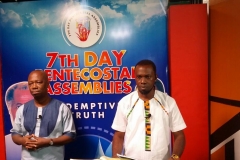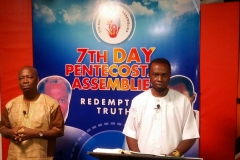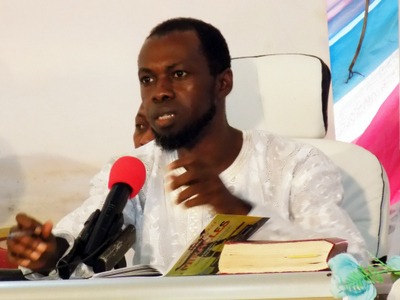Obadiah – A Cry of Judgment and Restoration
2011 New Year Camp Meeting
(31st Dec. 2010 – 2nd Jan. 2011)
By: Elder Enoch Ofori Jnr
Obadiah – A Cry of Judgment and Restoration
“The House of Jacob shall Possess their Possessions”
Obadia, the shortest book of the Old Testament, contains the shortest prophecy in the Bible. But it’s a prophecy of bliss set in the midst of woe like a gem hidden in a sand dune!
The message of the prophecy is straightforward: The enemies of God’s people will be destroyed, and the people of God will come into their own possessions!
The prophecy is set against the backdrop of the long–running rivalry between Esau and Jacob, a rivalry that came into being when Jacob ‘stole’ both Esau’s birthright and blessing (Gen 27:36, 41).
Right from verse l, the Lord utters an oracle of doom against Edom, the nation descended from Esau, for joining forces with Israel’s’ heathen enemies against the house of Jacob:
“For thy violence against thy brother Jacob shame shall cover thee, and thou shalt be cut off for ever.
“In the day that thou stoodest on the other side, in day that the strangers carried away captive his forces, and foreigners entered into his gates, and cast lots upon Jerusalem, even thou wast as one of them.
“But thou shouldest not have looked on the day of thy brother in the day that he became a stranger; neither shouldest thou have spoken proudly in the day of distress.
“Thou shouldest not have entered into the gate of My people in the day of their calamity; yea, thou shouldest not have looked on their affliction in the day of their calamity, nor have laid hands on their substance in the day of their calamity;
“Neither shouldest thou have stood in the crossway, to cut off those of his that did escape; neither shouldest thou have delivered up those of his that did remain in the day of distress” (vv.10 – 14).
Vanity and pride was the ruin of Edom! In advance of Edom’s certain destruction, the LORD had already passed judgment:
“Behold, l have made thee small among the heathon: thou art greatly despised.
“The pride of thine heart hath deceived thee; thou that dwellest in the clefts of the rock, whose habitation is high; that saith in his heart, Who shall bring me down to the ground?
“Though thou exalt thy self as the eagle, and though thou set thy nest among the stars [with a secondary prophetic allusion to the space age], thence will I bring thee down saith the LORD.
“Shall I not in that day, saith the LORD, even destroy the wisemen out of Edom, and understanding out of the mount of Esau?
“And thy mighty men, O Teman, shall be dismayed to the end that every one of the mount of Easu may be cut off by slaughter” (vv. 2 – 4, 8 – 9; see Job 9:4).
However, the localized affair soon takes on a global dimension; the destruction decreed against Edom comes upon all the heathen enemies of Israel in the day of the LORD:
“For the day of the LORD is near upon all the heathen: as thou hast done, it shall be done unto thee: thy reward shall return upon thine own head.
“For as ye have drunk upon My hold mountain, so shall all the heathen drink, and they shall swallow down, and they shall be as though they had not been.
“But upon mount Zion shall be deliverance, and there shall be holiness; and the house of Jacob shall possess their possessions” (vv.15-17).
Two lessons emerge from the Esau/Jacob rivalry as presented in Obadia: (1) “A man’s enemies are the men of his own house” (Micah 7:6); (2) God’s chosen people will take their possessions.
A man’s enemies being the men of his own house does not necessarily mean one’s relatives. They could be some of one’s acquaintances, business associates or even fellow worshippers. The persecution of the chosen and the blessed is an age–old phenomenon. Although Easu was also blessed by Isaac “concerning things to come” (Heb. 11:20), he hated Jacob his brother because the latter had the birthright blessing (see Dent 21: 15-17).
Believers too as God’s chosen people (1 Peter 2:9) have the birthright blessings of God’s “Church of the firstborn” (Heb. 11:23; Jam. 1:18).
Consequently, we have been “blessed with all spiritual blessings in heavenly places in Christ” (Eph. 1-3). Indeed, all things are ours (1 Cor. 3: 21).
Persecution is bound to rear up its ugly head against us in so far as “all that will live godly in Christ Jesus shall suffer persecution” (2 Tim. 3: 12, cp Mark 10:29-30). Esau’s hatred of Jacob sets a precedent for all God’s people called to inherit a blessing (1 Peter 3:9). Yet our birthright blessings cannot be taken away from us:
“Now we, brethren, as Isaac was, are the children of promise.
“But as then he that was born after the flesh persecuted him that was born after the Spirit, even so it is now.
“Nevertheless what saith the scripture?
Cast out the bondwoman and her son for the son of the bondwoman shall not be heir with the son of the freewoman” (Gal. 4:28 – 30).
The apostle Peter wrote:
“If ye be reproached for the name of Christ, happy are ye’ for the Spirit of glory and of God resteth upon you: on their part He is evil spoken of, but on your part He is glorified” (1 Peter 4:14).
The blessings stay in spite of all that the enemy does, for “There is no wisdom nor understanding nor counsel against the LORD” (Prov. 21:30). Indeed, “the LORD will perfect that which concerns” His people; He will not forsake the works of His hand (Ps. 138:8). Thus while the nations squirm in their own blood of destruction, “upon mount Zion shall be deliverance, and there shall be holiness; and the house of Jacob shall POSSESS THEIR POSSESSIONS”.
Note, Jacob possesses not another’s possessions but his own possessions. The blessing is part of our calling and covenant status as members of “the house of Israel” with whom God has made a new covenant (Heb.8:10-12). In the Sermon on the Mount, the Lord Jesus Christ referred to this when He said, “seek ye first the Kingdom of God, and His righteousness; and all these things shall be added unto you” (Matt. 6:33; see also Mark 10:: 29-30).
On the day of judgment, “the King shall say unto them on His right hand, Come, ye blessed of My Father, inherit the Kingdom prepared for you from the foundation of the world” (Matt. 25:34).
“The house of Jacob shall possess their possessions”, and the blessing shall endure, because “He will ever be mindful of His covenant. He hath showed His people the power of His works, that the may give them the heritage of the heathen” (Ps 111: 5-6).
That is the power of Divine covenant It’s unbreakable! Here’s God’s promise to the seed of Jacob:
“Thus said the LORD, which giveth the sun for a light by day, and the ordinances of the moon and of the stars for a light by night, which divideth the sea when the waves thereof roar, the LORD of hosts is His name:
“If those ordinances depart from before Me, saith the LORD, then the seed of Israel shall cease from being a nation before Me for ever” (Jer.31:35-36).
So Israel will remain blessed. As the children of the Divine covenant, it’s not possible for us to be cursed or destroyed: “I am the LORD, l change not: therefore ye sons of Jacob are not consumed” (Mal. 3-6). “There is no sorcery against Jacob, nor any divination against Israel” (Num. 23:23). Balaam, the spiritualist hired by Moabite King Balak to curse Israel, confessed in desperation:
“How shall I curse whom God has not cursed? And how shall I denounce whom the LORD has not denounced?
“For from the top of the rocks l see him, and from the hills l behold him; There!
A people dwelling alone, not reckoning itself among the nations.
“Who can count the dust of Jacob, Or number one–fourth of Israel? Let me die the death of the righteous, and let my end be like his!” (Num. 23:8-10 NKJV).
Israel is indestructible! The God of Israel will go after each and every enemy of ours to secure our heritage of blessing. (Read Ps 114). And the great enemy will not escape:
“In that day the LORD with His sore and great and strong sword shall punish leviathan the piercing serpent, even leviathan the crooked serpent; and He shall slay the dragon that is in the sea.
“[And] He shall cause them that come of Jacob to take root: Israel shall blossom and bud, and fill the face of the world with fruit” (Isaiah 27:1, 6).
Our faithful God of covenant will judge the enemy and restore us. We will possess all our possessions in Christ, for what the LORD blesses is blessed forever (1 Chron. 17:27).
However, we must walk uprightly before Him to befit our status as His covenant-keeping people:
“O thou that are named the house of Jacob, is the Spirit of the LORD straitened [restricted]? Are these His doings? Do not My words do good to him that walketh uprightly?” (Micah 2:7).
His words will surely do us good, for “saviours shall come up on mount Zion to judge the mount of Easu; and the Kingdom shall be the LORD’s” (Obadia 1:21). Amen!



